From a traditional military march to a balloon parade, musical performances and a re-enactment of the nation’s history, tens of thousands of Taiwanese and foreigners yesterday experienced a series of unique celebrations for President Tsai Ing-wen’s (蔡英文) inauguration.
Hours before the ceremonies in front of the Presidential Office Building started, nearly 30,000 people had arrived, with some eager to find seats, while others talked with friends and took photographs against the backdrop of the main stage and the building.
A 21-gun salute also drew a large crowd, who surrounded the soldiers to take photographs.
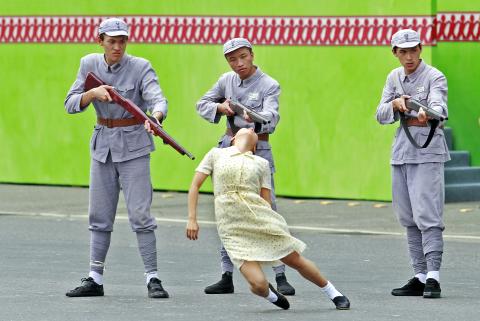
Photo: Chiang Ying-ying, AP
A performance by the joint military marching band started the celebrations at 9am.
Following the band’s performance was a re-enactment of Taiwanese history, from the activities of the Aboriginal inhabitants to the Dutch and Spanish occupation, the Han Chinese migration, Japanese occupation and the Chinese Nationalist Party (KMT) regime’s authoritarian rule after World War II. A performance about the nation’s democratization followed.
Various artists who have participated in social movements, such as rock band Fire Ex (滅火器), Lin Sheng-xiang (林生祥) and Panai Kusui, performed on a stage erected in front of the building.
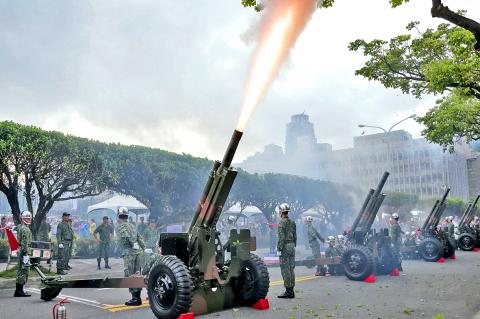
Photo: EPA/Military News Agency
Actors depicted campaigners for major political and social movements in Taiwan’s democratization — such as Deng Nan-jung (鄭南榕), who ran a number of dissident magazines and self-immolated in 1989 in protest against government restrictions on the freedom of speech, and the 1990 Wild Lily Student Movement, which helped accelerate the dissolution of the national assembly.
After Tsai and Vice President Chen Chien-jen (陳建仁) completed the official handover and swearing-in ceremony inside the Presidential Office Building, they walked out to greet the crowd and were saluted by the military band at 11am.
Before Tsai’s inaugural address, a group of Paiwan children, several children’s choirs and Jingmei Girls High School students joined Tsai and Chen in singing the Republic of China national anthem, rearranged to blend in with a traditional Paiwan tune.
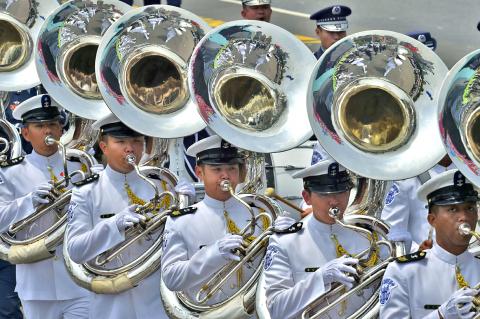
Photo: Sam Yeh, AFP
“This is not the first time I have attended a presidential inauguration, but the performances today were great. I liked them a lot,” onlooker Lan Cheng-peng (藍正朋) said. “In the past, programs were designed to convey a sense of the authority of the president, but this time, it is more like a festival and you could see that the celebrations were centered around the people, not the political leader.”
While the performances drew many positive reviews, they were not without detractors.
Some rights advocates said that some of the performances showed the popular belief that the arrival of Western religion and influenced helped rid Aborigines of their “boorish and uncultivated” characteristics.
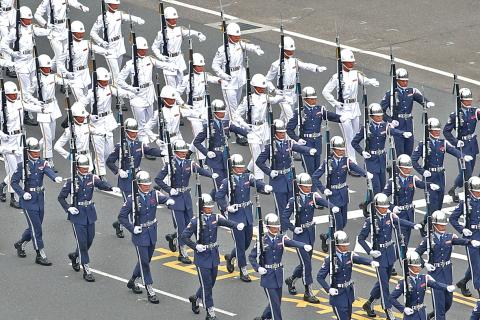
Photo: CNA
The celebrations ended with the singing of Meilidao (美麗島, Formosa) and a fly-by by the air force’s Thunder Tiger Squadron.
Meilidao, a folk song from the late 1970s, describes how beautiful Taiwan is and how the people’s ancestors are watching over them. The song was banned by the former Chinese Nationalist Party (KMT) government after the 1979 anti-government demonstration organized by Formosa magazine, which also became known as the Kaohsiung Incident.
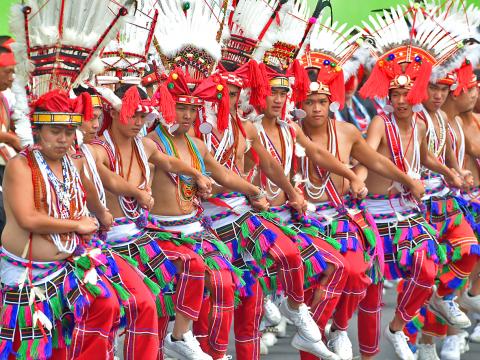
Photo: Liao Chen-huei, Taipei Times
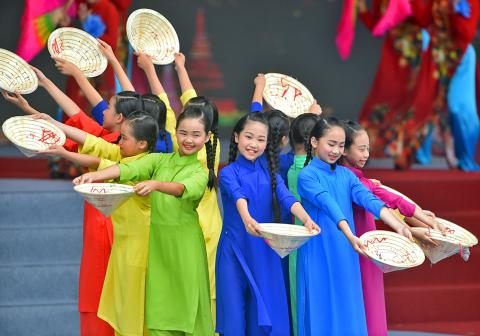
Photo: Liao Chen-huei, Taipei Times
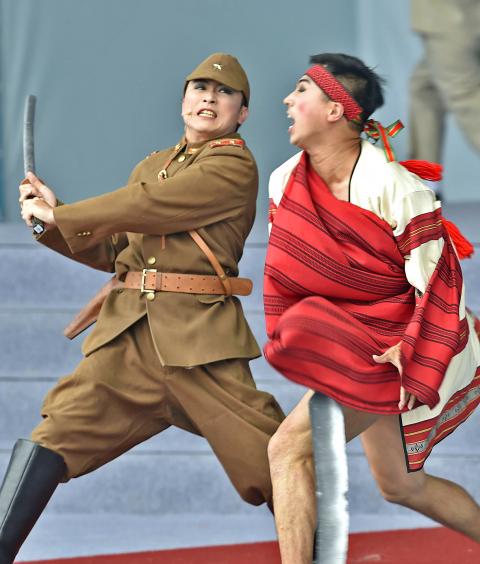
Photo: Sam Yeh, AFP

SECURITY: As China is ‘reshaping’ Hong Kong’s population, Taiwan must raise the eligibility threshold for applications from Hong Kongers, Chiu Chui-cheng said When Hong Kong and Macau citizens apply for residency in Taiwan, it would be under a new category that includes a “national security observation period,” Mainland Affairs Council (MAC) Minister Chiu Chui-cheng (邱垂正) said yesterday. President William Lai (賴清德) on March 13 announced 17 strategies to counter China’s aggression toward Taiwan, including incorporating national security considerations into the review process for residency applications from Hong Kong and Macau citizens. The situation in Hong Kong is constantly changing, Chiu said to media yesterday on the sidelines of the Taipei Technology Run hosted by the Taipei Neihu Technology Park Development Association. With

CARROT AND STICK: While unrelenting in its military threats, China attracted nearly 40,000 Taiwanese to over 400 business events last year Nearly 40,000 Taiwanese last year joined industry events in China, such as conferences and trade fairs, supported by the Chinese government, a study showed yesterday, as Beijing ramps up a charm offensive toward Taipei alongside military pressure. China has long taken a carrot-and-stick approach to Taiwan, threatening it with the prospect of military action while reaching out to those it believes are amenable to Beijing’s point of view. Taiwanese security officials are wary of what they see as Beijing’s influence campaigns to sway public opinion after Taipei and Beijing gradually resumed travel links halted by the COVID-19 pandemic, but the scale of

A US Marine Corps regiment equipped with Naval Strike Missiles (NSM) is set to participate in the upcoming Balikatan 25 exercise in the Luzon Strait, marking the system’s first-ever deployment in the Philippines. US and Philippine officials have separately confirmed that the Navy Marine Expeditionary Ship Interdiction System (NMESIS) — the mobile launch platform for the Naval Strike Missile — would take part in the joint exercise. The missiles are being deployed to “a strategic first island chain chokepoint” in the waters between Taiwan proper and the Philippines, US-based Naval News reported. “The Luzon Strait and Bashi Channel represent a critical access

Pope Francis is be laid to rest on Saturday after lying in state for three days in St Peter’s Basilica, where the faithful are expected to flock to pay their respects to history’s first Latin American pontiff. The cardinals met yesterday in the Vatican’s synod hall to chart the next steps before a conclave begins to choose Francis’ successor, as condolences poured in from around the world. According to current norms, the conclave must begin between May 5 and 10. The cardinals set the funeral for Saturday at 10am in St Peter’s Square, to be celebrated by the dean of the College